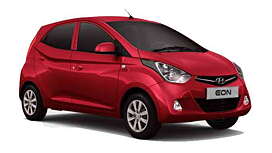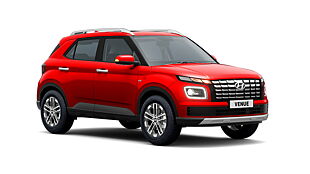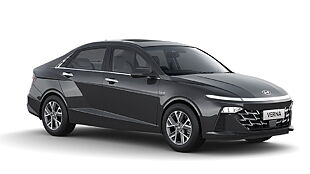Overview

The ideal first step. Both these cars are bought mainly by first time car buyers. But the debate rages on about which of the two one should settle for. AUTO BILD INDIA finds the answer.
Till a few years back the decision to buy your first car was fairly a straightforward one, courtesy the lack of option. However today, besides the tried and tested alto, there’s the Nano, and if you stretch your budget a bit, the Spark is also a worthy option too. Then there’s the Eon, a car that has set a number of benchmarks in its segment; barring sales numbers.
One of the reasons for the latter is that majority of first time car buyers are averse to risk. The Alto for the same reason continues to be on a song. But, now there’s a new version of Maruti’s best-selling car and to see how good the Alto 800 is, we decided to pit it against the class benchmark. On test here is the top of the line Alto 800 Lxi with driver’s airbag going up against the closely priced version of the Hyundai, the Eon Era+.
Exterior & Interior
The Era+ doesn't get stereo and airbag (as pictured), but the silver accents, the dual tone interiors and more upmarket feel remains. On the handling front, the Eon isn't as sharp as the Alto though.
The difference in street presence is obvious, but when you open the taps, the Alto leads the Eon be it acceleration, rollons or fuel efficiency.
Both these cars might be entrylevel offerings, but Hyundai has done well to give the Eon an upmarket presence. It looks more contemporary as well. The Alto has a completely new skin but it looks basic and lacks any sort of flair. The idea being in order to appeal to a large and diverse buyer base, it’s best to go in for a palatable design than one thatmight polarise opinion and with it alienate a section of buyers.
The Eon would be our pick even when it comes to the interiors. The design is fresh, the wellness coefficient is high and the ergonomics way better. The materials used look and feel richer, the fit and finish is of a higher level and design for the instrumentation, the central console and even the door inserts and the likes, should make the Eon buyers feel very good about their purchase. Moreover, it has more comfortable and supportive seats and better designed and executed storage areas like the large and deep door pockets for the front doors and the stowage areas on the dash top and the central tunnel. The Eon is also easier to get in and out of, by the way.
The Alto 800 is an improvement over the older Alto, no doubt, and is better on the inside than the K10 even. But again, the front seats are too low with hardly any thigh support. The floor pedals are poorly positioned and things like the centrally mounted switches for the front-only power windowsand the thin driver side only door pocket come across as hasty inclusions. And, eventhough the stowage under the central console is nicely executed, there’s little else that adds to the practicality of the cabin. It’s also a cabin that looks basic, which is driven by cost cutting more than anything else.
The Alto 800 isn’t a lot more spacious than the previous car either and is short on room compared to the Eon in almost every area too. It has more leg andhead room up front compared to the Hyundai, but that apart,the Eon offers more shoulder and elbow room, bigger seats and a higher ingress/egress height. At the rear, the Alto fallsbehind on every count. It is narrower on the inside and the usable kneeroom is lesser too. And, to add to its woes, it can’t match the Eon’s boot space in terms of sheer volume either, or its higher usability.
The stereo is an aftermarket fitment but driver's side airbag is standard on this Lxi version. Quality, look and feel of interiors not as good as on the Eon, but the Alto surely is more fun to drive.
The Eon looks smarter from all angles. The Alto 800 looks more slab-sided in comparison, and this after all the exterior panels on the 800 being new.
As far as underpinnings and the drivetrain go, the Eon was never the class benchmark. Its engine was too loud and the vibrations at idle were excessive even for a three-cylinder engine. The steering lacked feel and the handling wasn’t exactly sharp or involving. Though, we did like the ride quality on the Eon.
In the Alto 800’s company, the Eon’s shortcomings in this area continue to be highlighted.
What’s more, the Alto is actually more fun to drive overall. The car feels lighter, more chuckable and predictable around bends. It turns into corners with more surety and though there’s body roll, it isn’t as much as on theEon. The steering though isn’t great and feels as dead as on the Eon. Plus, the Alto’s thin tyres struggle to keep pace with the chassis and run out of grip a lot sooner than we would have liked and it only understeeres when driven at the limit.
Straight line stability for both cars is at par. These do similar top-speed and both feel nervous when pushed beyond the 130kmph, especially if the road is undulating. The Eon thoughis surprisingly quieter of the two inside the cabin at such speeds. On the Alto one can hear the engine, the wind as well as the road noise more than the Hyundai.
Engine & Gearbox

Hyundai Eon-The Eon's three-cylinder engine is noisier and more vibey.
The Alto too uses a three cylinder engine, but the Maruti’s engine is way more refined and easier revving. It is essentially the same unit that powered the older Alto but with a longer plastic intake, shorter pistons for higher compression and thinner piston rings, the engine’s efficiency as well as the torque curve has improved. Now, it might make lesser power and torque compared to the Eon’s engine, but it does help the Alto post quicker acceleration times. It takes almost two seconds less to hit 100kmph from a standstill compared to the Hyundai. The Maruti records better roll-on times as well.

Maruti-Suzuki Alto 800-The Alto's engine is smoother, more efficient and manages to pack better performance too.
Now, both cars use a five-speed manual ‘box, but the Alto’s is better geared for all means and purposes. That it has better shift quality is, of course, an added bonus. As a result, the Alto is more derivable across all gears, especially in the top two gears where it takes almost four seconds less to complete the roll-on tests. But that’s not all; the Alto is also more efficient both in the city and out on the highways, and by a decent margin.
Dimension
Hyundai Eon (mm) |
|
 Eon Thanks to a slightly longer wheelbase and better space utilisation on the inside, the Eon boasts of more interior room. It also has higher ingress. |
 Alto 800 Compared to the older Alto, the space has increased but not by much. It has more head room at the front and the knee room has improved too. |
Maruti-Suzuki Alto 800 (mm) |
|
 The Eon's boot is more useful even with the rear seat folded down. |
 The Alto has a smaller, less usable boot but a lower loading lip height. |
Scorecard & Verdict
1) Hyundai Eon- The Eon remains the entry-level car to buy and the Era+ version is decently equipped too. Moreover, for a little more money, one can opt for better specced versions as well.
2) Maruti-Suzuki Alto 800- For single people, who love to drive and mostly drive alone, the Alto 800 should be fine. However, as the only car in the family, it can't match the Eon's practicality and comfort.
Scorecard
Body: The Eon is more spacious all round and it has a bigger, more usable boot as well. It has richer feeling interiors too. In fact, the quality of materials as well as the fit and finish and build is clearly better on the Hyundai. The Alto feels quite basic in comparison. The two cars do have similar weight carrying capability and because we have the Alto Lxi with a single airbag, it scores higher to safety.
Drive: Given the lesser weight and better sorted gearing, the Alto simply runs away under the Drive head. It is quicker off the line and stays so till the car hits its top-speed of 140kmph. It is more driveable too but more importantly eventhough it packs in better performance (from a lesser powerful engine),it still manages to return better fuel efficiency all round.
Comfort: The Eon wins under this head. The Alto rides better thanks to its longer travel suspension but then loses out when it comes to seating comfort and the ease of getting in and out of the car. It is also louder inside the cabin overall and then falls behind when it comesto ergonomics and operability. It does handle better, nonetheless.
Dynamics: There's nothing to choose between the two cars under the Dynamics head. Both are found equally wanting for steering response and grip, but then both cars score really well for manoeuvrability and for their tightturning circles. However, given the total scoring so far, the Eon emerges as the better product.
Cost: The Alto 800 might be cheaper by Rs 10,000. It might also have better resale value on its side, but it is let down by poor warranty. For a mass-market car where buyers are looking for peace of mind, the least Maruti could have done was matched Hyundai's offer on the Eon. Overall then, the Eon wins.
Verdict
As was the case between the Eon and the Alto K10, the Alto 800 too is a better car to drive and the Eon struggles to match up with it on the mechanical end of things. However, as a product to buy and own, the Eon scores higher. It is more comfortable, practical and more spacious. It also looks and feels modern and upmarket compared to the bare-bone Alto. Plus, if you have slightly more money to shell out, there are a lot more versions to choose from adding to the choice. The Eon then is our winner and remains the entry-level car to buy.

























